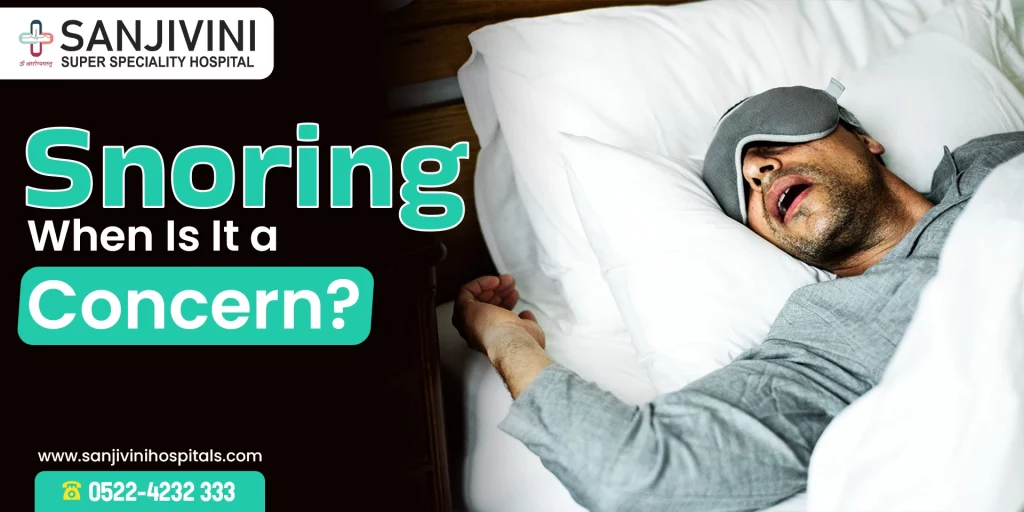Medically Reviewed by: Dr. Abhishek Gupta MBBS, MD-FIP EDARM
Have you ever been jolted awake by the sound of someone snoring? Or perhaps you’re the one guilty of producing those nighttime symphonies yourself. Snoring, often dismissed as a harmless annoyance, can sometimes signal more than just a noisy night’s sleep. While occasional snoring is normal, persistent and loud snoring could indicate underlying health issues. In this blog post, we’ll delve into the world of snoring, exploring when it’s merely a nuisance and when it warrants closer attention. So, grab a cup of tea, settle in, and let’s uncover the truth about Snoring: When Is It a Concern?
Understanding Snoring
- Snoring occurs when relaxed throat tissues vibrate as air passes during sleep, resulting in a rumbling noise.
- Causes are categorized into physical factors (e.g., throat and mouth anatomy) and lifestyle factors (e.g., alcohol consumption, allergies).
- Mechanism of Snoring:
- During sleep, muscles in the mouth’s roof, tongue, and throat relax, partially blocking the airway and causing tissue vibration, notably in the soft palate.
- Different parts of the throat produce various snoring sounds.
- Types of Snoring:
- Various snoring sounds result from the vibration of different throat parts.
- Concerns Regarding Snoring:
- Occasional snoring is typically harmless, but persistent, loud, or disruptive snoring may signal sleep apnea, a serious disorder.
- Prolonged snoring heightens the risk of health issues like stroke and heart attack.
- Seeking Medical Advice:
- Consulting a healthcare provider is recommended if snoring regularly disrupts sleep or leads to other issues as snoring not only affects your medical health but also disturbs mental and physical and mental health.
Also read: The Importance of Lung Health Screening
When Is Snoring Normal?
- Occasional snoring, snoring without other symptoms, and snoring related to temporary factors like congestion or allergies are generally considered normal.
- It’s quite common, affecting 20-40% of people.
- When it happens sporadically and isn’t linked to other health problems, it’s usually harmless.
- However, if snoring is loud, disruptive, or happens frequently, it might be a sign of sleep apnea, which is a serious condition.
- In these cases, seeking medical advice is wise.
- Persistent or troubling snoring patterns should be monitored and addressed.
- Long-term snoring can increase the risk of health issues, including stroke and heart attack.
When to Be Concerned About Snoring
- Frequency and Intensity of Snoring:
- Loud, disruptive, or frequent snoring can be a cause for concern.
- It may indicate underlying issues such as sleep apnea, a serious disorder.
- Chronic snoring could also increase the risk of health conditions like stroke and heart attack.
- Associated Symptoms:
- Symptoms such as daytime fatigue, gasping or choking during sleep, and pauses in breathing (a sign of sleep apnea) should be taken seriously.
- These symptoms may suggest an underlying health issue requiring medical attention.
- Impact on Quality of Life:
- Snoring’s disruptive effects on sleep or symptoms like fatigue, headaches, infertility, daytime sleepiness, and tiredness should prompt a visit to a healthcare provider.
- Long-term snoring can negatively impact quality of life and may be associated with various health risks.
- Addressing concerns related to snoring early on is essential for overall well-being.
Health Risks Associated with Chronic Snoring
- Obstructive Sleep Apnea (OSA):
- Chronic snoring may indicate OSA, linked to higher risks of diabetes, obesity, hypertension, stroke, heart attack, and other cardiovascular problems.
- OSA reduces oxygen levels, potentially damaging the heart and increasing the likelihood of heart disease.
- Central Sleep Apnea:
- Snoring can also be a symptom of central sleep apnea, characterized by breathing pauses during sleep.
- While less common than OSA, central sleep apnea remains a concern due to its impact on breathing patterns.
- Cardiovascular Risks:
- Chronic snoring contributes to heart disease, high blood pressure, and irregular heart rhythms.
- Hormonal surges triggered by snoring can elevate blood pressure and increase the risk of heart attacks and other cardiovascular issues.
- Cognitive Effects:
- Chronic snoring leads to daytime sleepiness, difficulty concentrating, and heightened risks of conditions like stroke.
- It can impair cognitive function and elevate blood pressure, further compounding health risks.
- Importance of Addressing Chronic Snoring:
- Chronic snoring should be addressed promptly, especially if it disrupts sleep or is accompanied by other symptoms.
- Taking action can significantly improve an individual’s health and overall well-being.
Also read : Embracing a Healthy Lifestyle for Respiratory Wellness

Seeking Help for Snoring
Diagnosis:
- Consultation with a healthcare provider: A healthcare professional can assess the severity of snoring and its potential causes. They will also inquire about associated symptoms and perform a physical examination.
- Sleep studies: Sometimes, a healthcare provider may suggest a sleep study to monitor various body functions during sleep and diagnose sleep disorders like sleep apnea.
Treatment options:
- Lifestyle changes: Making adjustments such as weight loss, avoiding alcohol before bedtime, addressing nasal congestion, and ensuring adequate sleep can help reduce snoring. Sleeping on your side instead of your back and elevating the head of your bed may also be beneficial.
- Oral appliances: Dental devices can keep the airway open and prevent the tongue from falling back during sleep, thereby reducing snoring.
- Continuous positive airway pressure (CPAP) therapy: This involves wearing a mask connected to a CPAP device during sleep to keep the airway open. It’s often used to treat snoring related to obstructive sleep apnea.
- Surgical interventions: Procedures like uvulopalatopharyngoplasty (UPPP) or somnoplasty may be recommended to address anatomical issues in the airway and reduce or eliminate snoring.
It’s crucial to consult a healthcare provider for a thorough evaluation and to discuss the most suitable treatment options tailored to individual circumstances and the underlying cause of snoring. Seek consultation with Dr. SN Gupta, a renowned pulmonologist and sleep care expert, at Sanjivini Super Specialty Hospital in Lucknow.

